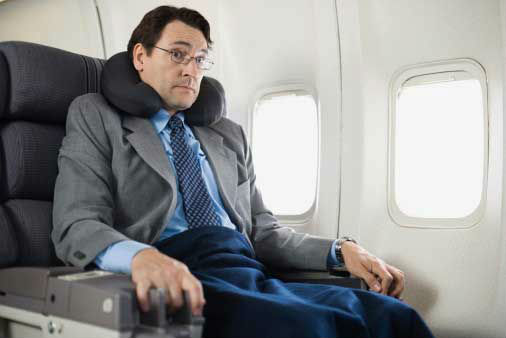 With the approach of summer, the topic of blood vessels during flight becomes more and more relevant, and for many people the idea of the forthcoming air flight causes heart palpitations, because some people experience aerophobia (fear of flying on an airplane) and these feelings, or rather their anticipation, block the desire to relax away from home. If you are a "core" or a person who regularly raises blood pressure and often cheeks a heart, the information presented in this article will help you to transfer the flight with the least strain on the heart and blood vessels. In this article, we will talk about how to protect blood vessels during flight, as well as in the first days of your holiday in exotic countries.
With the approach of summer, the topic of blood vessels during flight becomes more and more relevant, and for many people the idea of the forthcoming air flight causes heart palpitations, because some people experience aerophobia (fear of flying on an airplane) and these feelings, or rather their anticipation, block the desire to relax away from home. If you are a "core" or a person who regularly raises blood pressure and often cheeks a heart, the information presented in this article will help you to transfer the flight with the least strain on the heart and blood vessels. In this article, we will talk about how to protect blood vessels during flight, as well as in the first days of your holiday in exotic countries.
How does air travel affect the heart?
During the flight, the pressure in the cabin of the aircraft is approximately equal to the pressure at an altitude of 2500 m above sea level. With decreasing atmospheric pressure, the amount of oxygen in the cabin of the aircraft falls - this is the main risk factor for increasing blood pressure, hypertensive crisis and the development of a heart attack. Anyway, the pressure drops in the cabin of the aircraft are felt by everyone, but in people with a weak heart the flight can end with a "cardiovascular catastrophe" and cause problems with blood vessels during flight. A sharp drop in atmospheric pressure and a decrease in the oxygen concentration in the cabin of the aircraft is already noted at an altitude of 3000 m, and for long flights the aircraft is gaining a great height, up to 11,000 m, which sharply reduces the flow of oxygen into the blood - this is very dangerous! Some, even healthy people, especially people suffering from heart disease (coronary artery disease, angina attacks, suffered myocardial infarction, arteriosclerosis of blood vessels and hypertension), may need additional oxygen inhalation.
But! Unfortunately, not all airplanes have oxygen cushions on board, because many airlines prohibit taking on board oxygen. The additional oxygen on board is an explosive, especially if it is a long flight at high altitude.
What to do?
• Before flying and booking tickets, specify whether there is an oxygen inhaler (oxygen pillow) in the cabin of the aircraft.
• If you order a tour, etc. In the travel company, ask the tour operator: Do they have such a service during the flight and can you order it?
• There is another option. For 3 - 4 days before departure, book the oxygen inhalation service. The order is made by a doctor who issues a certificate of what you need or you may need additional oxygen during the flight.
• For a quieter flight, before landing, take 1 tablet of Validolum under the tongue, and the second pill before take-off. While Validolum will be in your mouth, you will be more relaxed and you will not need candy to put off your ears while climbing by plane.
• People with angina attacks are advised to take 70mg of aspirin and 1 tablet of nitroglycerin in order to avoid a possible heart attack.
• People who underwent myocardial infarction within 6 months after the illness, air travel - are prohibited, in order to avoid a heart attack and the development of a repeated heart attack.
• Before landing take valerian. This will remove fear of flying, reduce heart palpitations, relax and soothe you.
• During the flight you need to distract yourself: talk, read magazines, favorite book, solve crossword puzzles, etc.
It is good, if the vessels cope with these jumps, but what if the stress-worn organism is so unwell? If you suffer from cardiovascular diseases, if your blood pressure tends to run out of the norm, be sure to take the medicines prescribed to you by your doctor and keep them in an easily accessible place so that you, your neighbors or the stewardess can easily cope with the sudden increase in pressure or an attack of angina pectoris. If health causes you anxiety - ask the doctor if the body is ready for flights.
What to do?
- Do not put your foot on your leg (from this, the blood vessels contract and suffer even more).
- Do not hold your legs in a bent position for more than 1 hour, do not put them under yourself (this significantly disrupts blood circulation and increases the pressure on the vessels of the legs).
- The legs should be in a level position as long as possible - this improves blood flow.
- Move your feet.
- Every 30 minutes, get up and walk around the cabin.
- When ordering a ticket, ask to give you a place not at the window, but at the aisle. Sitting by the aisle, you can spread your legs, bend and unbend them. You will move more often, get up and do not disturb a number of sitting people.
Fulfilling these recommendations, it will not become a test for your heart and blood vessels during flight. In the new climate there are special air, special water, special food and special time. All this knocks down habitual biorhythms, according to which a man lives at home. The heart, blood vessels and the body as a whole, in such a situation can be seriously outraged and will make you pay attention. Blood pressure may rise, dizziness, headache, a feeling of lack of air, absent-mindedness, uncaused irritability, disturbance of stool and sleep. Therefore, the first 2 - 3 days, you need to spend in the mode of habituation. After the flight you should get a good night’s sleep, have a delicious meal and go to fresh air, explore the surroundings. These rules will help you to avoid problems with blood vessels during flight.



